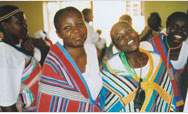Protecting the Environment

In Cambodia, a community leader helps villagers identify their property boundaries to protect their property from illegal logging and poachers. USAID supports programs that encourage the understanding of property rights and helps protect the environment.
USAID ENVIRONMENT PROGRAMS
Afghanistan, Bangladesh, Cambodia, East Timor,
Egypt, India, Indonesia, Iraq, Jordan, Lebanon, Nepal, Philippines, Sri Lanka, Vietnam, West Bank/Gaza and
Yemen
CONTACTS
John Wilson
Senior Environmental Officer
Tel: (202) 712-4633
Email: jwilson@usaid.gov
Overview
The continued social and economic development of the Asia and Near East (ANE) region rests on responsible stewardship and sustainable use of its natural resources. The challenge is great – demands on natural resources and environmental systems are intensifying due to population growth, inequitable national policies, poverty and corruption. Energy demand in the region is also rising steadily, a cause for concern due to the region's high pollution rates and reliance on imported fossil fuels.
Programs
MAKING CLEAN WATER AVAILABLE TO COMMUNITIES
Eighty percent of the world’s population without adequate sanitation lives in Asia, as does almost two-thirds of those without clean drinking water.
Sadly, over 500,000 young children die from water-borne diseases in the region each year. Increasing water shortages also heightens tensions, increasing the potential for conflict. In response, USAID has launched a Blue Revolution Initiative that aims to increase broad-based access to safe water and improved sanitation for security, prosperity, and health in Asia and the Near East. Through this initiative, USAID will work in partnership with other Federal agencies, national and local governments, regional organizations, other donors, and the private sector to reduce tensions associated with water; promote more efficient use and reuse of water; improve utility operations and service delivery; and increase municipal and private financing for water supply and sanitation.
SLOWING FOREST LOSS
In Asia and the Pacific, over 850 million hectares of land are degraded and forest loss has accelerated. A UN study found that South Asia is losing at least $10 billion annually due to land degradation. This puts economies and communities that depend on natural resources at risk, exacerbating poverty and conflicts. To protect those resources, USAID involves the people who live around them and depend on them for an income in managing them wisely. USAID supports innovative partnerships to protect Asia’s unique forest biodiversity, combat illegal logging, and promote responsible timber trade by transforming the market for tropical timber to achieve sustainability. USAID also works to address conflict bred from increased competition over forest resources and weak governance of forest regions.
PROVIDING CLEAN ENERGY FOR GROWTH
Energy demand in Asia is expected to increase by nearly 50 percent over the next 15 years. Yet, air pollution levels in the largest ANE cities are among the highest in the world, causing an estimated 1.5 million deaths per year. Providing an adequate energy supply for population and economic growth is a challenge for most Asian countries. USAID establishes free market policies to help reform and strengthen the energy sector, assists institutions working on energy development and encourages regional trade in clean energy.
Back to Top ^
|


